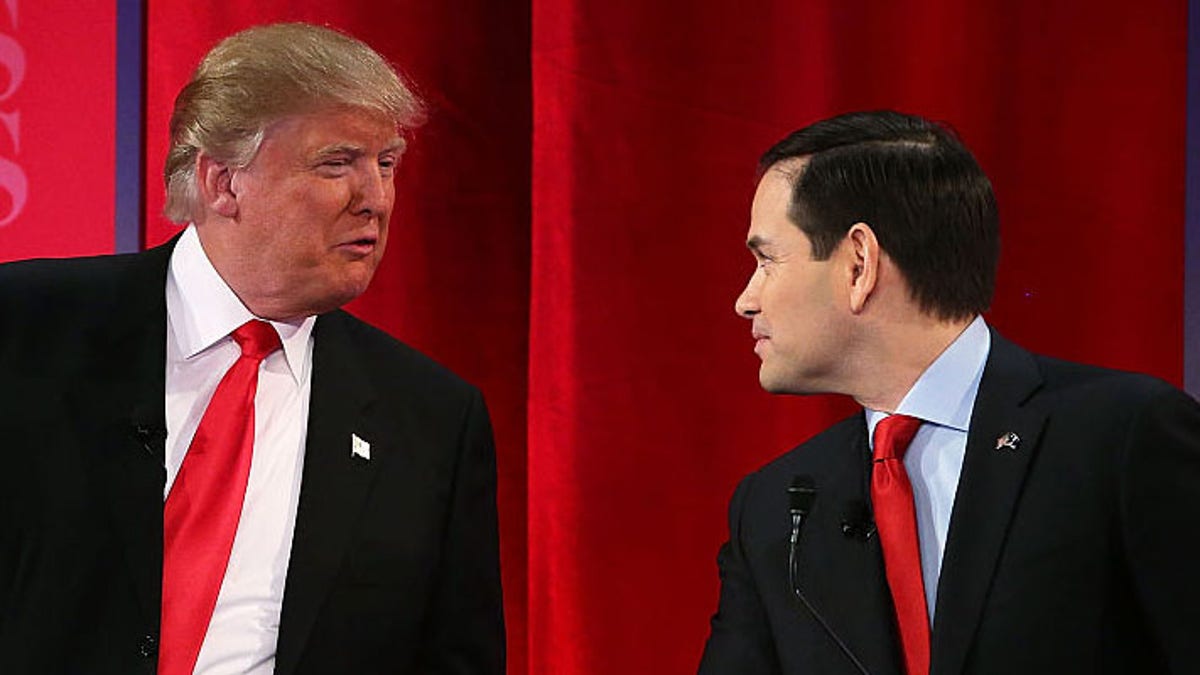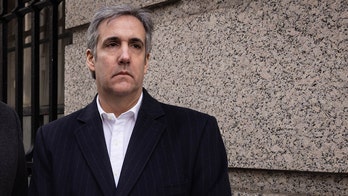
GREENVILLE, SC - FEBRUARY 13: Republican presidential candidates Sen. Marco Rubio (R-FL) (R) listens to Donald Trump (L) during a break of a CBS News GOP Debate February 13, 2016 at the Peace Center in Greenville, South Carolina. Residents of South Carolina will vote for the Republican candidate at the primary on February 20. (Photo by Spencer Platt/Getty Images) (2016 Getty Images)
The presidential election roller coaster ride continues its climbs and dips for Sen. Marco Rubio, who at the moment is considered to be Donald Trump’s biggest competition for the GOP nomination.
After his impressive second-place showing in conservative South Carolina on Saturday, the junior senator from South Florida is seen as the GOP field’s best chance to beat – or slow down – the irreverent and flashy billionaire, who makes the party’s establishment leaders nervous.
With the exception of the days after his much-criticized performance at the New Hampshire debate earlier this month, Rubio has been the GOP establishment’s favorite candidate since it became clear that his one-time mentor and ally, former Florida Gov. Jeb Bush, was not the inevitable nominee for the presidential election that he once was expected to be.
Many experts believe that with Bush’s exit from the race after a poor showing in South Carolina, Rubio is the only real establishment candidate and has enough support and qualities to have a shot at being the GOP nominee, according to Roll Call.
To be sure, Ohio Gov. John Kasich, who came in fifth in South Carolina, remains in the race, though pressure is growing on him to drop out. And there is Sen. Ted Cruz, the Texas firebrand, who came in third, close enough to almost tie with Rubio.
But Cruz’s finish in South Carolina was seen as poor for the conservative candidate who had been expected to do much better in a state where evangelicals – a core electorate for Cruz – hold considerable sway in the primaries.
The thinking among political observers is that if Cruz didn’t pull off a strong finish in a state that was seen as favoring a candidate like him, he cannot be expected to do as well or better in less conservative states that have primaries coming up.
Many see the Nevada caucuses on Tuesday as a potentially defining moment, according to Roll Call. And then there is Super Tuesday, on March 1, when many states will hold their primaries.
Will GOP establishment voters who now do not have Bush among their choices flock to Rubio, and can he get the anti-Trump vote that he and Cruz badly want?
And will Trump’s working class devotees come out, as they have been, to support him and keep him far ahead of the competition?
History does not hold out hope for Rubio, given that every GOP candidate who has eventually has won the GOP nomination has, like Donald Trump, been the top vote-getter in New Hampshire and South Carolina, notes Roll Call.
“Now this race is getting narrower,” Rubio said in a Fox News interview on Sunday. “It’s getting down to three people.”
Rubio believes a narrower GOP field will hurt Trump and help him.
“Seventy percent [of GOP voters] does not support [Trump],” he said, adding that as the GOP field shrinks, “it’ll be easier and easier for this 70 percent to coalesce” around remaining contenders.
So far, Trump has 67 delegates. That is twice as much as the other candidates all put together, said Roll Call.
Bets are on him to win the Nevada caucus.
For Super Tuesday, Trump will need to hold on to his strong support, which many experts theorize has been fueled by a large field of candidates. With the crowd winnowing down, Trump’s ability to pull in strong support will be tested.
Rubio has been saying he’s the best candidate to win the general election.
“Rhetoric is not enough,” Rubio said in the Fox News interview. “You can just stay you’re going to make America great again…You have to explain how you’re going to do it.”
Cruz is insisting that he is in the best position to beat Donald Trump.
“It’s apparent the only campaign that can beat Donald Trump, and has beaten Donald Trump, is our campaign,” he said in a CNN interview, referring to his Iowa caucus win.
Ben Carson, the retired neurosurgeon who enjoyed a short streak of strong poll showings, is still in the race, despite doing poorly in the primaries, including coming in last in South Carolina.
Like us on Facebook




